




05. BUILD A PROFITABLE, PURPOSEFUL REAL ESTATE BUSINESS YOU LOVE












Welcome to the inaugural issue of 500 Doors Real Estate Magazine!
When clients look for a Realtor, they are looking for an expert - someone with unique insight into their specific needs and the property types they're interested in. But even a self-styled jackof-all-trades master agent might not have the exact experience a client needs: Not all markets have condos; not all agents are comfortable with commercial properties.
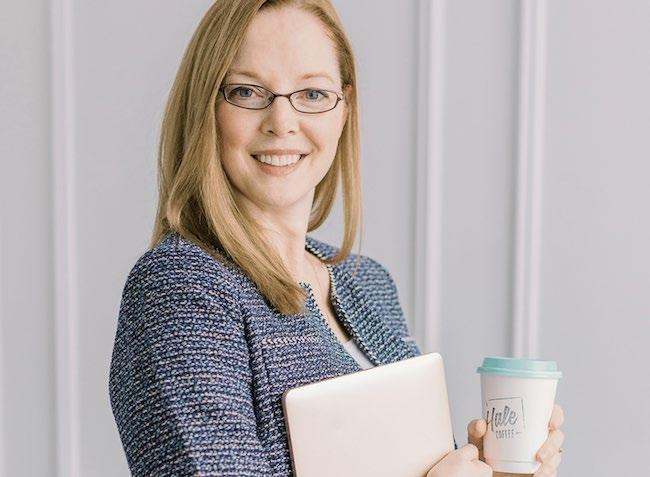
As a Fractional Leader, Rob Gaudio brings 25 years of diverse and balanced experience (operations, finance, marketing, ownership) provides a valuable perspective for entrepreneurs/business owners when facing the significant challenges to achieve growth and overcoming obstacles.

Some areas, such as downsizing, are emerging and will soom make up a significant part of many agents' businesses. Others, such as firsttime buyers and investment clients, are critical to any Realtor's survival. All of them, however, are worth an agent's time and careful study.
Finding your niche can be an important step in establishing yourself as an agent. It doesn't need to define who you are, but it can position you as an expert in the eyes of potential clients. If you can exceed their expectations once, they'll come back so you can do it again.
In this issue, 500 Doors REM reached out to a number of Realtors and experts in the industry to share their stories of success and how they have found their niche and navigated their chosen submarkets. We hope you enjoy the read and find something to help you land that next deal.
Christine Cowern is the Founder and Managing Partner of The Christine Cowern Real Estate Team, an all-female team of experienced, passionate, client-centric realtors. She helps urban professionals build their real estate wealth through strategically buying, renovating and investing in property. Julie Haskill Chief Editor Known as the Queen of Resilience, Kim teaches the emerging generation of women real estate agents how to be resilient in uncertain times. From Kansas to Canada, Kim's integrity and ingenuity have been key to her success. Whitney Hutton is a real estate maven and director of Investor Education at Passive Investing, She started investing in real estate in 2002 and has since built a portfolio of over 700 million in real estate assets.podcasts.apple.com/us/podcast/500-doors-real-estate-podcast/id1563251565

Tahani Aburaneh Nov 8 9AM MST Tahani, is one of Canada’s top real estate investing experts, wealth coach, an Amazon bestselling author, but above all, a proud single mother of 2 grown children.
Whitney ElkinsHutten Nov 15 7PM MST Whitney is a partner in $700MM+ in real estate — including over 6300+ residential units and more than 1400+ self-storage units across 8 states—and experience flipping over $4.0MM in residential real estate.
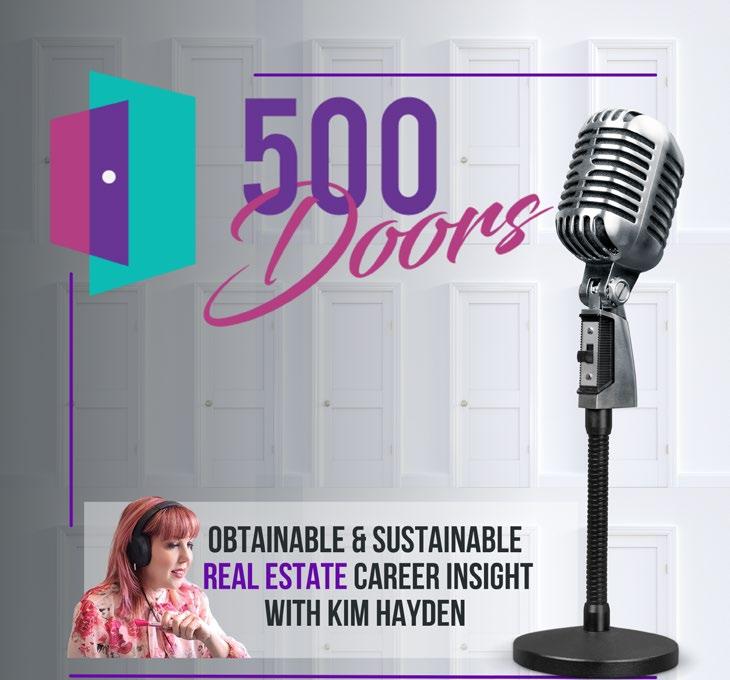
Christine Cowern Nov 22 9AM MST Founder and Managing Partner of the Christine Cowern Real Estate Team, an all-female team of passionate, client-centric realtors based in Toronto, Canada that has been in the Top 1-2% sales since 2013.

James Maaba Nov 29 9AM MST James found his love for real estate during his internship on a Top10 team at Douglas Elliman; he expanded his knowledge through a second position at a high-production office in Queens.
Eirik DaveyGislason Dec 6 7PM MST Master Certified Negotiation Expert, Instructor for the Real Estate Negotiation Institute, and founder of Archway Partners Coaching. Eirik is a practicing Associate Real Estate Broker with over 16 years of experience.
Susan Conely Dec 13 9AM MST Susan launched her consulting practice, ROCKbiz, in 2010 to focus solely on next-level client loyalty. She helps professional service providers cultivate loyal client relationships to create rock solid growth.
John Davis Mayfield Dec 20 9AM MST John Mayfield received his real estate license in 1978 at the age of 18. John has been a practicing broker since 1981 and is the author of eight books and creator of the “5-Minutes Series for Real Estate Agents."
Jas Takhar Dec 27 9AM MST Soon after deciding to try his hand in real estate, Jas founded REC Canada under Royal LePage, and for over 5 years has successfully kept his team in the top 3 in the country.

1 ½ cup sugar
½ cup water
½ cup vegetable oil
1 cup canned pumpkin (not the pie filling)
2 eggs
1 ⅔ cup flour
1 tsp nutmeg
2 tsp cinnamon
1 tsp pumpkin pie spice
1 tsp baking soda ¾ tsp salt ¼ tsp baking powder
INSTRUCTIONS
Mix first five ingredients and set aside
Sift together dry ingredients
Add dry ingredients to pumpkin mixture
Mix until smooth
Bake in large loaf pan for 50 minutes or a muffin tin for 30 minutes
Cooking times may vary so be sure to test with a toothpick in the centre and the pick comes out clean
You can add raisins and nuts. For dessert option serve with whipped cream cheese or a cream cheese buttercream.
Christine Cowern is a force to be reckoned with in the real estate industry. As the founder and managing partner of the Christine Cowern Real Estate Team, she has led her all-female team of passionate and client-centric realtors to be in the top 1-2% of sales volume since 2013.
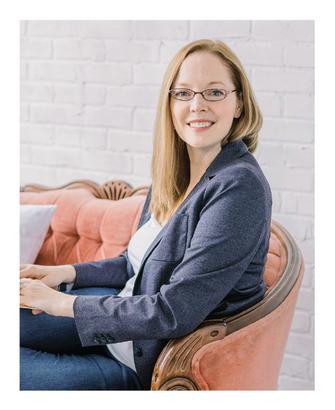
My journey from solo realtor to team leader to coach definitely wasn’t a linear one, but looking back I’m so glad that everything happened the way it did. Because every big move kept me in a space of expansion and growthtwo things that I put so much value in.
Back in 2007 when I began my career in real estate, if you’d told me that 5 years later I’d start and grow a real estate team, I may not have believed you. I’d moved back to my home city of Toronto after years of living away - it really felt like I was starting my life over again. So much of what I did in the first few years was hustle - to build my friend group and my client list and start establishing a name for myself in the incredibly competitive market I was working in.

And then I started figuring out what I loved doing and didn’t like doing as much (or wasn’t the best use of my time and skills). And I hired my first admin. As an A-type driver, delegating didn’t come naturally for me but I kept at it, and eventually freed up much more time to focus on what I did best - building relationships and serving clients at a high level.

My business grew from there - next by hiring an agent on my brand new team, then another and another. My team was growing and winning awards (we were consistently in the Top 1-2% for sales volume, something I definitely didn’t take lightly) so I brought on a managing partner to help me run things - which was one of the best decisions I’ve ever made. And then something happened in 2019 that was the catalyst to help me re-evaluate where I wanted the next chapter of my life to lead me. My son, who at the time of writing this is 3 years old, was born.
My real estate business was rewarding on many levels but I knew deep down that it was time to challenge myself again, get out of my comfort zone and try something new. I also wanted to stop working the long hours that came with selling - with 12-hour days being the norm. And so I made
 INTERVIEW WITH CHRISTINE COWERN
INTERVIEW WITH CHRISTINE COWERN
the very scary decision at the time to stop working with clients in the field and only focus on managing and growing my team.
That one decision freed me up to focus on another budding passion of mine - coaching women in real estate to create high-performing businesses and teams. And so my coaching business was born. Now, I wake up every day so excited to serve women in business while also doing what I love for my team.
Looking back, although my journey wasn’t always an easy one, every new direction built upon the one before it and capitalized on my strengths and my passions. It’s been the most fun, challenging, rewarding ride I’ve ever been on - and I wouldn’t change a thing.
There’s so much that wasn’t part of your licensing or brokerage training, like learning to compete with more experienced agents, standing out in a sea of competition and how to get motivated clients from your marketing and social media.
As a result you feel like you’re spinning your wheels, not sure where to focus your time, energy and money to get the best results in your business.
Get ready - try these three tips help you get on track!
1. Increase your number of daily conversations about real estate
First, you need to increase the number of daily conver sations you have about real estate. This can be done by networking with other professionals in the industry, attending events and seminars, and by staying active on social media and other online platforms. You should also make an effort to connect with potential clients in your community, and to let them know what you do and how you can help them. By doing this, you will be able to build relationships and trust, which is essential for success in the real estate industry.
The second step in Christine's process for becoming a successful real estate agent is to find your niche. This means focusing on a specific type of client or property that you are passionate about and that you can serve well. By niche-ing down, you will be able
to better focus your time and energy on becoming an expert in that area, which will in turn make you more successful. There are a few different ways to go about finding your niche. One is to think about your previous experience and expertise. Are you a former corporate executive? Then you may have a niche in working with other corporate executives. Or maybe you have a background in design and you're passionate about working with clients on their home renovation projects. Another way to find your niche is to simply start talking to people. Ask your friends, family, and acquaintances if they know anyone who is thinking of buying or selling a home. Attend local net working events and get to know the other businesses in your community. By getting out there and talking to people, you'll start to get a feel for who your ideal clients are and what kind of properties they're inter ested in. Once you've found your niche, the next step is to start marketing yourself as the expert in that area. This means creating content, such as blog posts or videos, that focus on your niche. It also means joining relevant Facebook groups or LinkedIn groups and participating in the discussions. By positioning yourself as the go-to expert
The third step is to delegate and leverage. This means that you need to start looking at what is your dollar per value. You need to look at what you are doing and see if there is anything that you can delegate or leverage to someone else. This could mean hiring someone to help with social media, hiring a real estate assistant, or outsourcing some of the other tasks that you are doing. This will help you to focus on the tasks that are most important and will help you to grow your business.
In order to be a successful real estate agent, you need to focus on increasing your number of daily conversations, finding your niche, and delegating and leveraging tasks. By following these three steps, you will be well on your way to achieving greater sales, improved efficiency, and increased profitability.
Connect with Christine Website: christinecowerncoaching.com Instagram: instagram.com/realchristinecowern Facebook: fb.com/christinecowernrealestatecoach
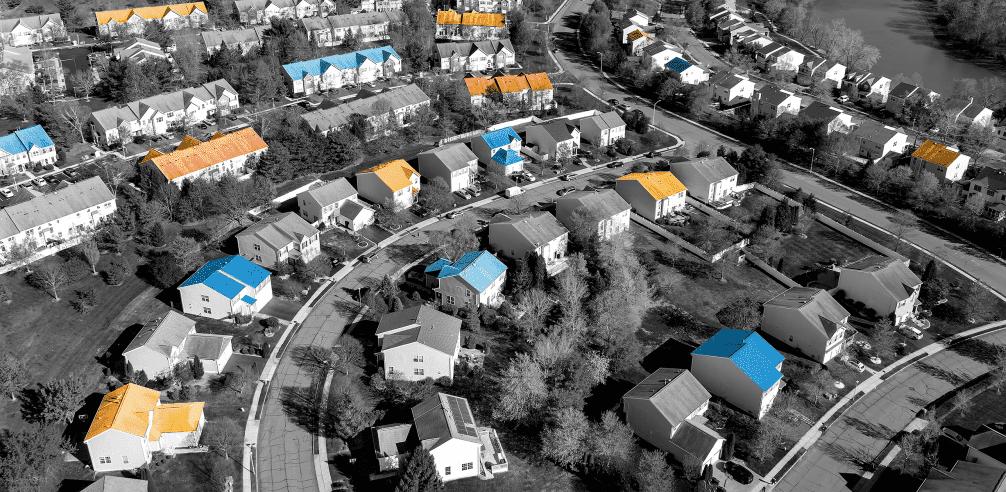 INTERVIEW WITHKIM HAYDEN
INTERVIEW WITHKIM HAYDEN
Kim Hayden is an award winning Real Estate Agent from Calgary, Alberta. She started her real estate career in 1999, and has since completed over 2000 Real Estate Transactions. As one of Calgary's top Realtors, Kim has a reputation of selling homes in both hot and ice cold markets. Kim is known for her community involvement and her dedication to her clients.
Kim Hayden's story is one of overcoming adversity and finding success in real estate. Kim was originally from Wichita, Kansas, and moved to Canada with her husband. She had no experience in real estate, but decided to get her real estate license and start a business.
Kim quickly learned that the most important thing in real estate is building relationships with people in the community. She started hosting events and building a brand around being a community leader. This helped her attract the right clients and grow her business. Kim's advice for people starting out in real estate is to control your communications and get to know your community.
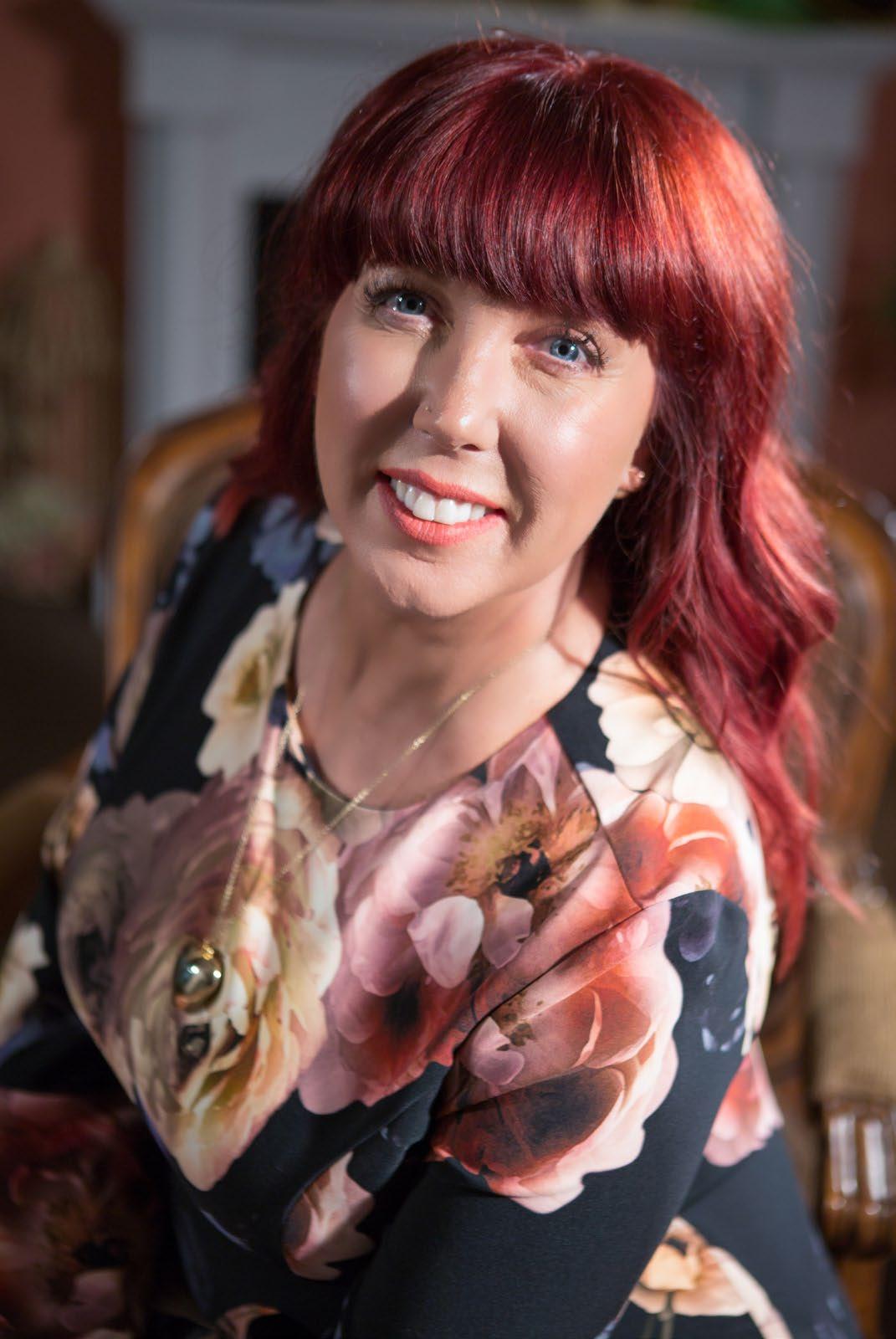
Kim Hayden's story is an inspiring one that reminds us that we can achieve success in real estate if we are willing to put in the extra hours and build rela tionships with our community.
Julie: Kim, I am so excited to have you tell me a little bit more about yourself today. Tell me what you're about and give me some insight into you.
Kim: I'm originally from Wichita, Kansas. I met my husband in Vegas. I was the worst waitress ever. Graveyard shift. But I waited on my husband. It must have been something there, because he married me, and we've been married for 29 years.
Moved to Canada, started off my journey in Canada and Toronto, and then ended up coming to Calgary. And in Calgary, I had a couple little ones. And I was sitting there going, I need a job, because I've never not worked. And I'm not. It takes a special kind of woman to be able to be a really high productive, full time domestic engineer.
And I'm not that woman. I mean, I have absolute utmost respect for those moms that pack balanced, healthy lunches and volunteer at schools, and I'm not that gal. So I looked at my husband, I said, I need a job. And I said, I think I want to open a coffee shop. I love talking to people and baking for them.
He goes, you have to be up at, like, 03:00 a.m. And I said, well, maybe I don't want a coffee shop, a lunch counter kind of gal. But he said the infamous words which will go on his grave, tombstone. Why don't you go into real estate? It looks easy.
Infamous last words. I went into real estate. I knew no one. I was in a new city, new country, young mom in a new community. I had no past work experience.
I mean, I literally was the opposite of what everybody tells you you need to have in order to be a successful real estate agent. But I kind of view myself as almost like an accidental real estate agent because my whole thing was about creating community. I've always been about community. And the first thing I did was start a mom's and tots group because I saw a need, a need. I needed to meet other women in my community, this
new community that had no infrastructure, no asso ciation, nothing to support the residents.
So I went to the local church, and I said, by the way, could we borrow one of your rooms one morning a week to do a non denominational community out reach for moms and tots? And we had a couple of dads in there, too.
I said, by the way, I want to be doing this moms and tots thing. Would you by chance sponsor tea and cookies? And they said, absolutely. And that started my first community initiative. And from there it liter ally grew into picnics in the park and the parade of garage sales and the pumpkin getaway.
In fact, the community was so new that you could watch your dog run away for days. And actually one of the first years we did a pumpkin chunkin. We decided that we would invite teams to build build a catapult. We took everybody's pumpkins and we chucked them. We had a pumpkin chunkin contest to see how far we could throw these pumpkins. But from these events, not only did I love what I was doing, I wasn't planning events for profit. I was creating community.
And from there I built six and seven figure 22 year business. And it was so organic. It wasn't like I was every month pressure to pick up the phone and dial, you know, ten people a day or to chase after for sale by Owner because for sale by owners just want to be respected in a decision. And it's such a small percentage of populace. I don't know why real estate agents always get a little, like selling the house themselves.
Julie: So what would you say is the most important lesson that you've learned over your career as a realtor?
Kim: The doors matter. The people that live behind the doors. I have had the blessing and honour to be at baptismals and weddings and at funerals. Unfortu nately, I have had the honor to be part of other peo ple's stores. And not just as a transaction, but at one of my pumpkin giveaways a few years back, I think it was like year 15 or something like that, this gal shows up and she's got these four kids all the way from like 15 years of the age down to probably like seven.
And she comes up to me, she goes, I just want you to know that this the pumpkin giveaway that you do every year for the food bank. My kids think that this is part of our Halloween tradition. And they know that we can decorate. As soon as they see the billboards go there, your bold signs go up for the pumpkin giveaway.
She wanted to say thank you. I think this is a really cool thing you do. Those kids are going to grow up with an example of community service.
I can't think of a greater legacy to leave behind, I truly can't. Because at the end of the day, money comes and goes, businesses come and go. Yet community, from the day the cavemen first walked upright, has been the core of human survival.
The reality is for the majority of human beings, con nectivity and communication and community are so critical to our growth and our survival and our stabil ity. And I showed that family, I showed those children, I was part of their lives and I helped them create the understanding or a perception of community.
Julie: Awesome. So in your opinion, what would be the most important personality trait that someone would need to work in your industry to be successful?
Kim: I think the most important personality trait is somebody with a sense of community. I don't think it's introvert or extrovert because let me tell you, an introvert can learn to speak with intention and en gage with intention. And yet a lot of introverts, this is where their superpower comes from. They listen.
And that is not a natural skill to extroverts. An extro vert may be able to walk up into a crowd and get it go ing and hey, how you doing? Shake hands with every body. But are they truly listening? Introverts listen.
I always think of the doors. Right behind every door is an opportunity. Also, a sense of community and understanding and a value of community, because that at the end of the day, when we retire, when we're dead and gone, when we're nothing but dust or in the dirt, the legacy we live behind is making the community a little bit better for the people we serve.
Julie: So what is one piece of advice you'd give someone starting out in real estate?
Kim: Well, I have two pieces of advice right off the bat. The very first one is have control of your community. The way that people communicate with you, the way people can get a hold of you. The biggest issue I see for a lot of new agents is that they will use the bro ker's URL. They will use their team's phone number, and they're putting all this effort out there to build business, to grow revenue, to create community. And at the end of the day, if they choose to switch brokerages or leave a team, all that work is gone.
So that would be the number one thing, is have true control over your community or your communica tions, how people can get a hold of you. So have your own URL and ensure that you have access to the phone number that you're sharing that is yours. If your team says that you have to use theirs, take a look at alternative modes of contact distribution, like through QR code. So these are things that's the num ber one and the number two get out and walk your community. Know who you're serving, know who's got a new garden gnome and who has a great wreath and who painted their door the most, godawful orange.
Get out there and know your community, because nothing gives confidence. Then when somebody calls and says, we're thinking about selling our house, would you come and do an evaluation? Okay, great. No problem. What's your address?
And they give you one, two, three, Main Street. And you say, oh, you're right. Did you just put up a new picket fence last year across the front? Yes. I love the hedges. I am so excited to meet you.
Nothing says confidence like knowing where the home is. And you can't do that from the Internet. You have to walk the streets. You have to walk you have to go up to the front doors. So these are really the two critical things and just everybody else.
I speak from a listing real estate perspective. Every thing I have done, honestly, we quit counting around 1600 transactions. We're estimating between 16 and 1800 transactions, but I know we're at 16 minimum, so 70% of that's listing. I always wanted to be on the
side of serving the home seller because it gave me more control over my own life, especially back in the day when everything was done by paper or fax, and I had to sit on a curb and wait for a real estate agent to come and get the contract and stuff. So I really wanted to be on the listing side of things because this allowed me to be a mom to my three kids and to be a host to my community.
And everybody always joked that I was the mayor of my community for a while there. By the way, there are no mayors in individual communities. Everybody knows in Canada, each community does not get its own mayor. It was a joke, or they called it my bubble, but most of my listings were within, like, five to eight minutes of my own home, which made it really super easy to serve my community. Right.
Julie: So, again, people starting out, just to clear things up, I know you said that famous last words were, real estate is easy. So what would you say is a common myth about being a real estate agent?
Kim: Flexible hours do not mean negotiable hours. You will still work your butt off. And if you aren't working your butt off, expect less than stellar re sults. National association of Realtors, which is the largest real estate body, does a study pretty much every year. They update it. The average real estate agent in the United States works 35 hours a week, and they make $57,000 a year. Yet as soon as you get from 40 to 50 hours, you go from $57K to $87K.
I raised three kids, and I probably worked on average in what would be deemed as work. I probably honest ly worked 60, 65 hours a week between delivering my door hangers, doing my home evaluations, hosting a moms, and tots group, things like that. But I will tell you, out of that 65 hours a week, only probably 35 of it felt like work. The rest was community leadership.
But that built my brand and my authority within the community. And that's the biggest thing, is most agents do not have a definable. They think they make a logo, and they have a brand. Your logo is not a brand. It's a marker.
And one of the sure signs of you're going to be part of the 87% failure is when you don't have a clear
vision and mission in place and your whole goal is money. Money is not a goal. Money is the byproduct of your goals. Money is the byproduct of your work, of your service. So if money is your goal, you'll fail.
Julie: That's great advice. And I love how you talked about building your personal brand. So whether you're an entrepreneur, startup, business, starting with the brand and having that strong, what you're about, who you're about, what your value is, positioning that to attract your dream clients is so important. So I love that you touched on that piece. So I know you like to ask all of your guests this, but what is your favorite quote and why?
Kim: I have so many. I would say that it's my defini tion of resilience. My past does not define my future.
And this I apply in everything. Meaning, if you're sit ting out there and the market dries up and it turns and it's harder to make and make it, your transac tions come together, it's harder to make your per sonal bills and everything. When you get up tomor row, your yesterday does not define the day that you're in. Last week does not define your week next week. It is what you choose to make of it.
I know a lot of people say that you're only as good as your last deal. I don't believe that. I believe your last deal is in yesterday and tomorrow is what you make of it, and that we all must be resilient.
My goal is to really help real estate agents lean into their true superpower, which is leadership and com munity creation. So that's what I'd love to do is invite everybody to join me in my new community: Real Estate Success with 500 doors on Facebook.
Connect with Kim
Website: resilientseries.com
Instagram: instagram.com/resilientseries Facebook: fb.com/groups/realestatesuccess 500doors
Podcast: podcasts.apple.com/us/podcast/500doors-real-estate-podcast/id1563251565
LinkedIn:linkedin.com/in/kim-hayden-74a203181
The Economist Intelligence Unit (EIU) has just re leased its latest Liveability Ranking, and Calgary has come out on top as the most liveable city in North America. The EIU is a world-renowned provider of deep insight and analysis on a global scale, and their reports are essential reading for anyone looking to gain a better understanding of the complex economic and political environment we now find ourselves in.
Canada has topped the list for being home to some of the most liveable cities in North America, domi nating four of the top five spots for the region.
Calgary was named the most liveable city in North America and the third most liveable city in the world.
Vancouver, Toronto and Montreal were named the second, third and fourth most desirable places to live in the region.
EIU ranked 173 cities on stability, culture and environ ment, education and infrastructure, and health care. The Liveability Ranking assesses key factors that make a city a great place to live, including stabil ity, healthcare, culture and environment, education, and infrastructure. Calgary scored highly across all these categories, with particularly strong marks in infrastructure and culture and environment. Calgary secured an impressive overall score of 96 points out of 100 in the survey. This was the most of any North American city.
This is great news for Calgarians, but it's also good news for anyone looking to invest in real estate in the city. With Calgary's population expected to grow by
nearly 20% over the next decade, now is the perfect time to get in on the ground floor of what is sure to be one of North America's hottest real estate markets.
Here's how Calgary stacked up in each category:
Stability: 9.4/10 - The low crime rate and lack of terrorist activity helped Calgary score well in this category.
Healthcare: 9.3/10 - With high-quality hospitals and clinics, Calgarians can rest assured they will be welltaken care of if they should fall ill.
Culture and environment: 9.2/10 - From its worldclass museums and art galleries to its beautiful parks and outdoor spaces, Calgary has plenty to of fer when it comes to culture and leisure activities.

Education: 8.9/10 - With two world-renowned univer sities, as well as plenty of public and private schools to choose from, parents can be confident their chil dren will receive a great education in Calgary.
Infrastructure: 9.7/10 - Thanks to its modern roads and public transportation system, getting around Calgary is a breeze – even during rush hour!
So there you have it – the EIU has named Calgary the most liveable city in North America! If you're thinking about investing in real estate here, now is the time to do it. With so much to offer residents of all ages and stages of life, there's no better place to call home than Calgary – especially now that it's been officially recognized as one of the best cities on the continent!
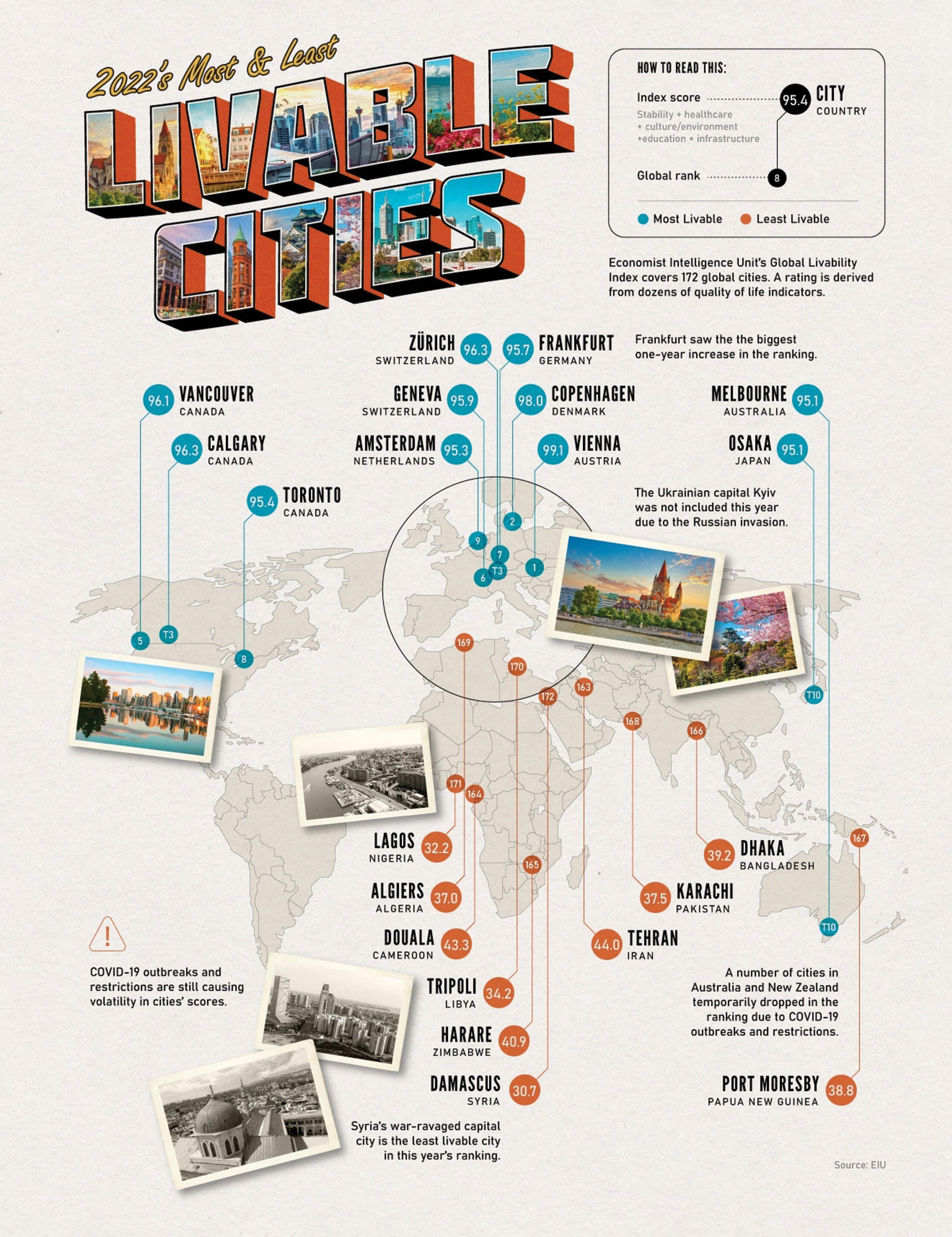
As the leaves begin to change colour and the weather gets cooler, we start to feel the excitement of the approaching holiday season.
For many of us, this time of year is a chance to reconnect with family, friends, and our community. It’s also a time to reflect on the year that has passed and to celebrate the changing seasons.
For many of us, the change of seasons is a time to celebrate. We mark the occasion with special food, traditions, and activities. But why is cel ebrating the seasons so important? There are many reasons, but here are my favourites.
My favourite traditions are baking and music!
There's something special about the holidays and baking. The warm smells of cinnamon and sugar, gingerbread and chocolate wafting through the house. The laughter of children as they help decorate cookies. The feeling of family and love that comes from sharing home-baked treats. It's no wonder that so many people love holiday baking!
Baking has been a part of the holiday season for centuries. In medieval England, fruitcakes were popular Christmas treats, often given as gifts. Baked goods were also used as decorations; gingerbread houses became popular in Germany in the 1800s. In North America, Dutch settlers brought recipes for cookies and pies to the country, which soon became holiday staples. Over time, baking has become an important part of many holiday traditions around the world.
So what is it about baked goods that make them so special? Part of it may be psychological; the holidays are a stressful time for many people, and the act of baking can be therapeutic. The smells of cinnamon and other spices have also been shown to boost mood and increase feelings of happiness and well-being. And let's not forget the taste! Chocolate, gingerbread, pumpkin spice... there's something for everyone to enjoy during the holidays.
So whether you're a seasoned baker or just getting started in the kitchen, holiday baking is a great way to show your loved ones how much you care. So get out your mixing bowls and rolling pins, and let's get started!
Ask anyone what their favourite part of the holidays is and you're bound to get a range of different answers. For some, it's the food, for others it's spending time with family, and for others still, it might be giving or receiving gifts. But there's one thing that just about everyone can agree on—and that's the
music. Holiday music has a way of making the season feel more special, no matter what you celebrate.
Here's a look at why holiday music is so important.
For many people, holiday music is intimately tied to tradition. Christmas carols have been sung for centuries and passed down from generation to generation. When we sing these songs, we feel connected to our ancestors and the history of our families. We feel a sense of nostalgia for holidays past and a sense of anticipation for holidays yet to come.
No matter what your religious beliefs or cultural background may be, holiday music has the power to make the holidays special. So turn on your favourite holiday song today and enjoy the spirit of the season!
There's no doubt about it—holiday music is an essential part of the season. So whatever holiday you celebrate this year, be sure to take some time to enjoy all your favourite tunes. From classics like Jingle Bells to modern hits like All I Want for Christmas Is You there's something for everyone to enjoy. And who knows? You might even find yourself singing along without even realizing it!
Holiday traditions are essential for creating lasting memories. Every year, we look forward to our favourite traditions like opening gifts on Christmas morning or eating latkes on Chanukah.
These memories give us something to look back on fondly and help us to appreciate all that we have been blessed with in our lives.
Another reason why celebrating the seasons is important is because they mark times of transition in our lives. The change of season can be a time to
reflect on the past year and set new goals for the coming one. It can also be a time to celebrate new beginnings, such as a baby's birth or a move to a new home.
Whatever transitions you may be experiencing in your life, celebrating the change of season can help you to embrace them and feel ready for what's to come.
Celebrating the seasons is important because it helps to create a sense of community. When we come together to celebrate, we create memories and traditions that bind us together. We also get to enjoy the company of others and share in their joys and sorrows. Celebrating the seasons is a great way to build relationships and feel like you belong to something larger than yourself.
One of the most important aspects of the holidays is spending time with family. In today's busy world, it can be difficult to find time to just sit and talk with our loved ones. The holidays provide a much-needed opportunity to reconnect with one another and catch up on what's been going on in each other's lives.
Spending time together also helps to strengthen family bonds and creates a sense of unity.
Holiday traditions are so important is that they provide a way for us to teach our children important values. For example, many families have a tradition of giving back to those less fortunate during the holidays. This could involve volunteering at a local soup kitchen or donating toys to a children's hospital.
By teaching our children the importance of giving back, we instill in them empathy and compassion for others – values that will stay with them for the rest of their lives.
In today's world, it's easy to feel disconnected from the natural world. We spend most of our time indoors, in front of screens, and we often don't even
know where our food comes from. By celebrating the changing seasons, we can create opportunities to connect with nature and appreciate all that it has to offer us.
In today's fast-paced world, it's easy to feel like we're constantly on the go and that we don't have time for anything else. But when we take the time to celebrate the seasons, it reminds us that there's more to life than just work or school. We belong to something bigger than ourselves—the cycle of life itself!
By slowing down and enjoying the seasonal changes, we can connect with something primal and ancient that will make us feel right at home.
Seasonal celebrations are an important part of many cultures around the world. They give us a chance to connect with nature, reflect on times of transition, and build community bonds. So next time you find yourself dreading the approach of winter or summer, remember that there's always something to celebrate!
When we celebrate the seasons, we not only connect with nature but also with our fellow human beings—both those who have come before us and those who will come after us. We remember our ancestors who depended on the changing seasons for their very survival. And we think about our children and grandchildren who will one day do the same. In this way, celebrating the seasons helps us feel like a part of something larger than ourselves—something that extends far into both the past and future.
The holidays are a special time of year when families come together to celebrate their traditions. These traditions play an important role in strengthening family bonds, teaching children important values, and creating lasting memories. So this holiday season, take some time to reflect on the importance of your family's traditions and cherish the time you have together. So get out there and enjoy all that nature has to offer! And while you're at it, take a moment to reflect on how lucky we are to be part of such a rich cycle of life—one that connects us with both our past and our future.


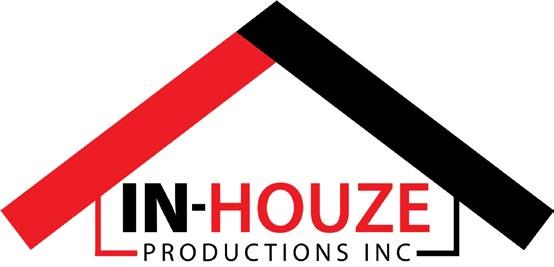




In the real estate business, conventional wisdom says that rising interest rates make buying or selling a home more difficult, and decreasing interest rates make buying and selling easier.


Yes, when interest rates fell to near zero, or in some cases actually went negative, that was literally free money for anyone who had the capacity to borrow, and a lot of folks had the capacity.
The recent rise in interest rates has been attributed to a number of factors, including the end of quan titative easing and the rise of inflation. This has led to a significant increase in the cost of borrowing for consumers and businesses alike and has put an end to the era of free money.
Add on top of record low interest rates a flood of Government Capital injected into the banking sys tem to support Covid programs, well you have the recipe for very high home prices in Commonwealth counties, like Canada, Australia, and the UK. Not to mention the US where Residential Real Estate has
become a blood sport of sorts to see just how ridicu lous house prices can get in some markets.
With mortgage rates on the rise, some have predict ed that home prices will start to fall. However, this is unlikely to happen by more than 5 or 10 percent. The reason is that there are still more buyers than there are homes for sale, so demand remains high. This means that prices are likely to stay stable, or even increase slightly in high demand markets, de spite the rise in mortgage rates.
Of course, the situation could change if more homes come onto the market and buyers start to feel squeezed by higher mortgage rates.
Here’s the thing, there is still, and will remain for the foreseeable future, a housing shortage. Yes the mar ket is slowing in terms of sales, but this has far more to do with capacity to purchase as so many potential first time buyers have been locked out due to the extremely high costs of residential housing.
Rising interest rates will have a bigger impact on con sumers, especially those who are carrying debt. The reason is that when interest rates go up, so do the minimum payments on credit cards and other loans. This means that people will have to pay more each month just to keep their debt from getting bigger.
To amplify an already bad situation for buyers (which drive any market and in turn home prices), rental rates have skyrocketed in tune with higher home prices. If Renters are having to pay more in higher rents and other costs of living, the likelihood of saving for a down payment for a first home dimin ishes rapidly.
As the days of free money come to an end, we are already seeing a dramatic slowdown in the purchase of new homes. While some analysts believe that home prices will recede, we believe that this is un likely given the current shortage of affordable hous ing. In fact, we predict that home prices are likely to remain flat over the next 5-6 years. This presents a unique opportunity for those looking to enter the market or upgrade their current home. If you have been thinking about buying a new home, now may be the time to act.
The COVID-19 pandemic sparked higher demand for housing, even as the market was arguably already overpriced and undersupplied. In our view, the elevat ed housing market has been an ongoing tail risk for the economy. Now, increased consumer leverage and rapidly rising interest rates could be the catalyst that pushes the housing market, and possibly the economy, into a slower growth or even recessionary phase.
So, where does this leave us. Basically, as far as I can tell we are in for a Real Estate market that has seen
its highs for a long time to come. Prices will settle back some but are not going back to where they were pre-pandemic. Much lower sales volumes will be the most noticeable effect on the housing market for the next 12 – 24 months, and we can already see that taking place in many markets. We can expect much lower sales numbers with most home prices stabiliz ing until interest rates also stabilize or even ach down which is what is expected to happen in 2024.
The recent rise in interest rates is a mixed bag for
mortgage home buyers and sellers. On the one hand, higher mortgage rates will mean higher monthly payments. On the other hand, prices are unlikely to rise, so buyers will still be able to find affordable homes. And while consumers will feel the pinch of higher interest rates on their debt, the impact is likely to be manageable. So while the era of free money is over, mortgage home buyers and sellers can still find good deals in today's market.
While we may continue to see volatility in the months ahead, for long-term investors this may provide an opportunity to diversify, rebalance, and ultimately add quality investments, in both the U.S. and Canada, at better prices.
If you have any questions or would like to share your thoughts on this topic head to our facebook page were we share our ideas and thoughts.
Connect with Doug Website: resilientseries.com
Instagram: instagram.com/resilientseries
Facebook: fb.com/groups/realestatesuccess 500doors
Podcast: podcasts.apple.com/us/podcast/500doors-real-estate-podcast/id1563251565
LinkedIn:linkedin.com/in/kim-hayden-74a203181
 BY ELLI JESPERSON
BY ELLI JESPERSON
As Fall fills the air, so does the nostalgic feeling of leaves changing and sweater weather. Encourage your creativity and learn techniques on how to make a Harvest Wreath with selection of dried botanicals with this DIY from Small Flower {floral studio}. Your everlasting wreath will give you that warm cozy feel ing year after year.
• Wire wreath form or willow frame
• Mixed foliage (fresh product with different textures)
• Mixed dried flowers and foliage, if you are making a winter wreath you may have pinecones, berries and other festive items
• Wire paddle or wax covered string
• Glue for finishing touches (use with care)
Additional items you may want to add:
• Ribbon, twine, or special accents from your own craft closet.
• Be sure to cover your workspace with plastic or paper to protect it from being damaged.
• You will be working with fresh products as well as dry products. The fresh product will shrink, so be sure to wrap the wire completely around each bundle until it is secure.
• Take some time to prepare by cutting your greens into manageable sizes so they are ready to be added to the wreath form.
• Securely tie the end of your floral wire to the wire ring and bind the first bundle of stems on, wrapping tightly.
• Use one hand to hold the stems flush with the wire ring. Using your other hand, wrap the stems with your floral wire paddle.
• Moving in one direction around the ring, gradually build up the number of stems you attach to the wreath.
• Lay a small bundle of greenery on the form, and wrap floral wire on a paddle tightly around the stems three times.
• Remember, you will keep the wire attached until you have added your last bundle of greenery. Do not cut it until the end.
• Add another bundle, overlapping the previous one by half; wrap the wire around the stems. Continue adding bundles until you reach the starting point.
• Add your layers slightly to the left of center and then with your next addition adding your bundle slightly to the right of center. This gives a kind of weaving effect that create a nice fullness to your wreath (like fish scales).
• Have fun with this step—this is where you make the wreath look fuller and add colour! Once you have some greenery attached, you can add other textural fill and flowers to your wreath.
• You can use floral glue to hold the delicate flowers in place. Note: The floral glue can take some additional time to dry.
• Once you’re near the end, you may want to change the direction of your placements to soften the look of the wreath.
• Once you’ve used all the foliage you’d like to, and when the entire form is covered, tie off the wire, leaving a few extra inches before cutting the end. Cut the wire and tie it off securely. Be sure to add a loop for hanging!
• Resist the urge to add or go back to an area of the wreath that you have already completed. When you are finished designing, hang the wreath on a blank wall, then step back and evaluate. Is there anything that needs to be added or taken away? If so, go back and add or remove elements as needed.
• After placing the wreath in your desired location, you’ll want to know how to care for your wreath so it lasts as long as possible. Indoor wreaths that are protected from direct sunlight should last you two to three years, while outdoor wreaths will have a shorter lifespan.
Elli Jesperson is an acclaimed florist based out of Calgary, Alberta, Canada. She has been in the floral industry for over 30 years and owns Small Flower {floral studio}. Get your botanical wreath kit or check out her upcoming floral workshops by visiting smallflower.ca
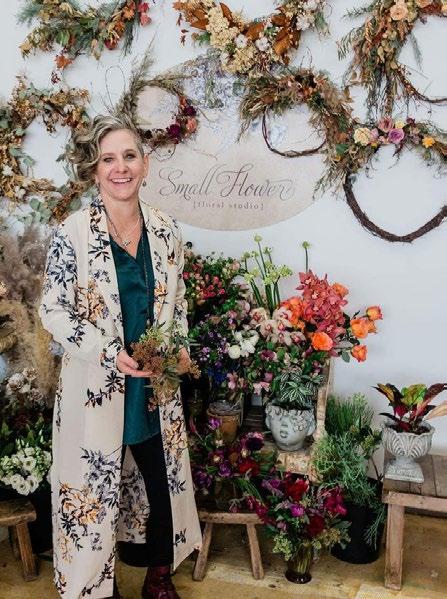
Whitney Hutton is the director of investor education at PassiveInvesting.com and a partner in over 700 million dollars worth of real estate. And that's multi family mobile home park, mobile. Home properties that is also single family residence and assisted living, plus more than 1400 self storage units across eight states. She's experienced in flipping over $4 million In residential real estate.

There are numerous ways to invest in real estate. Some people like to buy a single-family home and rent it out, taking advantage of rental income and potential capital appreciation. However, one way that can be potentially lucrative is to invest in real estate through group real estate investing.
There are typically two ways to invest in real estate with a group: syndication and real estate investment trusts (REITs). What are the differences, and which one is potentially the best for you?

Real estate syndications are private endeavors that aim to pool investor funds to make a big real estate purchase. Syndications have a sponsor (or sponsors)
that spear head the project — selecting the build ing, planning the project, raising funds and ex ecuting it. The sponsor forms a legal entity, typically an LLC, and then finds investors to put money into the project. The investor owns a proportionate share of the LLC and, thus, owns that percentage of the building and is entitled to their portion of the profits.
At first glance, REITs are similar to syndications; how ever, a REIT is a company that invests in properties and needs to adhere to many other requirements. Investors buy shares in the REIT and, thus, own that percentage of the REIT company rather than the property itself. As large corporations, REITs often trade on public exchanges and usually offer monthly income in the form of dividends.
Even though conceptually both of these investment ve hicles appear similar, they have quite a few differences that investors need to know. Here are the top four:
1. You’ll need more funds to invest in a syndication.
Perhaps the most significant difference between the two is the amount of capital you’ll need to in vest upfront to participate in the opportunity.
While there are private REITs, you can also find REITs on any stock exchange. If you load up your brokerage, and they support fractional shares trading, you can find a REIT and probably own a fraction of a share for as little as $1. The bar to invest in REITs is thus much lower.
Since a real estate syndication involves owning part of the LLC, which owns the building, while there’s nothing technically prohibiting a sponsor from taking a smaller investment from someone, it’s also far more of an administrative hassle and headache to accept that small of an amount of money than it would be worth. Most syndications have minimums of $50,000.
In order to invest in a group syndication, you will need to do your due diligence on the project and the operator. This includes understanding the business plan and the time frame for the invest ment. You will also need to make sure you are comfortable with the operator and the market.
The optimum time investment for a group syn dication is 3 to 5 years. This is because the tax benefits are maximized in the first 5 years, and after that the incentive to sell the property resets the depreciation clock. Therefore, it is in the best interest of the investor to hold the property for at least 5 years. The optimum time investment for a car wash development is 12 to 18 months.
2. What syndications and REITs own are different.
A syndication is a company built by the sponsor to buy a specific property. On the other hand, a REIT is a company that invests in a variety of real estate projects. REITs almost always have multiple projects, and as an investor, you may not have vis ibility into exactly where your investment is going.
For example, a REIT might have an apartment complex in Nashville, a mall in Houston and a
condominium complex in Las Angeles. With syn dication, you know the project and business plan and most importantly, the exact sponsors you are partnering with, and from there you can de cide for yourself if the investment is worthwhile.
3. Syndication and REITS have different structures.
Since REITs have a different structure, you can buy many of them no matter how much money or income you have. As noted earlier, if you have even a limited amount of funds and open a bro kerage account, you can buy into a REIT; however, with syndications, investors need to be classified as either accredited or sophisticated. Therefore, if you do not fit the accredited or sophisticated investor definition, a real estate syndication may not work for you.
4. The tax benefits are not equal. Real estate syndications have numerous tax bene fits over REITs. REIT income is considered ordinary dividend income, leading to a larger tax bill. How ever, real estate syndication’s income and depre ciation pass through to the investor’s tax return. In other words, syndication income can not only give you cash, but they can lower your tax bill by offset ting other income (like income from a job).
Which is better?
When you invest in a REIT or syndication, you’re getting many of the benefits of real estate without needing to manage it actively. Choosing between a real estate syndication and a REIT often comes down to the following factors: your desired level of control, how much you have to invest, the type of investor you are (accredited/sophisticated) and the returns and tax advantages you are looking for.
Whatever investment vehicle you choose, both syndications and REITs are fantastic ways to start investing in real estate with little to no time commitment.
Connect with Whitney Website: passiveinvesting.com LinkedIn: linkedin.com/company/passiveinvest ing-com Facebook: fb.com/passiveinvesting

So, you’re thinking about a career in real estate? You’re not alone. A career in real estate can be very rewarding, both financially and personally. The re wards come in many forms.. If you are thinking of making a change, or starting your work ing life, here are some things to consider about a career in real estate.
If you are looking for a career that is both financially and emotionally rewarding, real estate is definitely worth considering. If you are driven and motivated, the sky's the limit in terms of what you can achieve.
First and foremost, a career in real estate is a people business. You’re constantly interacting with clients, many of whom are going through one of the most important transactions of their lives. It’s immensely gratifying to be able to help them through that pro cess and come away with not only a satisfied client but also a new friend.
A career in real estate is rewarding because you are helping people achieve their dreams. Whether it’s
finding the perfect starter home or selling their fam ily home of many years, you are playing an important role in making people’s dreams come true. Seeing the joy on your clients’ faces when they finally find (or sell) their perfect property is its own reward.
Another aspect of a career in real estate is the flex ibility it affords. As your own boss, you can set your own hours and work around your other commit ments. This flexibility is great for those with families or other commitments that make full-time employ ment difficult. Just keep in mind, flexible is not negotiable. You will still put in 40+ hours a week, the benefit is that it can be managed for your schedule.
Another reward of a career in real estate is the compensation. When you sell a property, you will receive a commission based on the sale price. The commission is typically split between the buyer’s and seller’s agents, but as a real estate agent, you will keep a percentage of the total commission. The more properties you sell, the more money you will make.Joining a team may be an excellent way
to launch your career and the com pensation will be different. Most really great teams offer training to help you get started.
While there is no guarantee of success in any career, real estate offers the potential to make a very good living. According to the National Association of Realtors, the median annual income for agents in 2021 was $54,330 and 35 hours a week.. The amount earned rose to $87,000 annually at 40+ hours a week. However, top earners in the field made over $250,000 per year. So, if you are looking for a career that has the potential to support you and your fam ily comfortably, real estate is definitely worth considering.
The steps to getting started:
1. Get your license. In order to work as a real estate agent, you must have a valid real estate license. The requirements for getting a license vary from state to state, but generally involve completing a certain num ber of hours of coursework and passing an exam.
2. Join a real estate company. Once you have your license, you’ll need to find a company to work for. When choosing a company, look for one that has a good reputation and is well-established in your area. It’s also important to make sure that the company has the type of properties that you’re interested in working with.
3. Start building your clientele. One of the most important things you’ll need to do as a real estate agent is build up your clientele. There are lots of ways to do this, but some of the most common in clude networking, attending open houses, outreach to your spheres of influence and geo farming.
4. Stay up-to-date on industry changes. The real estate industry is constantly changing, so it’s important that you stay up-to-date on the latest news and trends. This will help you better serve your clients and make sure that you’re always ahead of the competition.
5. Mentorship / Coaching. This imperative to build an award winning career. Having consistency and accountability can be the difference between making six figures in year three or becoming part of the 87% that leave the business.
These are just a few of the things you need to do to get started in a real estate career. While it may seem like a lot at first, once you’ve taken the first steps, the rest will fall into place.

A career in real estate can be very rewarding! If you’re thinking about making the jump, just remem ber that you’ll need to get your license, find a good company to work for, start building your clientele, lean into your leadership and stay up-to-date on industry changes. With some hard work and dedica tion, you can be successful in this exciting industry!
Finally, real estate is a great way to build long-term wealth. Unlike most other professions, there is no limit to how much money you can make in real estate. With hard work and strategy, you can easily become a mil lionaire through your real estate business.
Join our facebook group for more great tips on get ting started in the real estate industry.
facebook.com/groups/realestatesuccess500doors
As a commissioned sales professional with unpredictable income, it can be a challenge to plan and manage your business or personal finances. Then add in the confusion of comingled bank accounts with reactionary spending habits. Does this sound familiar?

In my 30+ years as an entrepreneur and in consulting small business owners, I always start with the fundamentals of understanding and managing financials. First off, it’s important to operate from a Busi ness Money Mindset. “You”, as a real agent, ARE a business. This is not just a profession or job, you are a “for-profit business”. So it’s critical that you think like one and act like one.
This starts by understanding how businesses operate financially, which includes the traditional Financial Statements: Profit & Loss, Balance

Sheet, and Cash Flow. Each of these are important in understanding your financial performance and ultimately these are your financial scorecards.
Profit & Loss: Income (sales) – Expenses (spend ing) = Profits (savings)
This is your “annual scorecard” on how much money you are saving and keeping. Profits are savings. It’s easy to make money, but can you save it?
Balance Sheet: Assets (cash, investments, etc) –Liabilities (debts) = Net Worth
Your profits (savings) from last year are added to your assets (cash). This continues to build toward your net worth. The goal is to continue to build these assets each year. Eventually you can trade these as sets by using the cash to invest or buy other assets (ie house).
Cash Flow: Money in – Money out
This represents the flow of money with specific attention to dates. As you spend and receive, it gets measured. So you may expect a sale to come through, but until the payout lands into your bank account, it’s not measured. Your bank accounts need to have more money than what goes out. This may seem very basic, but it’s the very challenging when planning with unpredictable income. So it’s critical to have savings built up from prior years to cover any low periods.
This is where many small businesses fail in their financials. An entire year will go by, and they’ll look back in confusion over the low savings or even losses. They allocate their time towards sales and market ing and do not give enough priority to tracking their financial performance. Accurate and timely data are paramount to staying on top of your business.
Bookkeeping is historical only. By the time you look at this data, it’s too late. The money is already spent, and those months have flown by. Most people have heard of or use budgets, whether personal or for business. However, many do not really understand how to properly use them. Typically they get used for historical recording of past spending. However,
that is only a portion of what is required for financial success. It starts with tracking your spending and in the appropriate classifications. For agents, it’s im portant to separately track your business spending (ie marketing, licensing fees, etc) and your personal spending. The more detailed your grouping, the more insight on how to measure performance, iden tify opportunities to cut, monitor trends, etc. When you are familiar with these groupings, it’s much easier to react in a timely manner.
The more important step is to use this historical spending in your budget and then create a forecast for the upcoming year into these spending buckets. Based on last year's spending, identify how much is necessary to spend in that same grouping. Allocate a monthly amount per grouping and subtotal the various groupings. These are your total expenses.
Then, estimate your sales. For your Profit & Loss forecast, you can estimate an annual amount. Sure you may not know when the sales will occur, but based on your historical data, you can roughly esti mate expected income. Forecasting should always be conservative, so you need to allocate enough buffer for unexpected spending and lower than expected sales.
For your Cash Flow, you will break down the forecast into more detail by creating a monthly budget for the calendar year. Expenses can be fixed monthly, and some can vary month to month (ie marketing, train ing, fees) so some months will be higher and some lower. You may or may not have new cash coming in each month, so consider these highs and lows.
Additionally, it’s essential to remain timely with monthly upkeep and analysis. Each month record the bank activity and compare it to your forecast. Having eyes on this monthly allows for timely adjust ments to cut spending or to increase investment as sales grow. Unexpected expenses come up in busi ness and personal, so you need this accurate data in order to make these smart decisions.
Remember, you are a for-profit business. So let’s use the tools to keep score and celebrate those wins!
